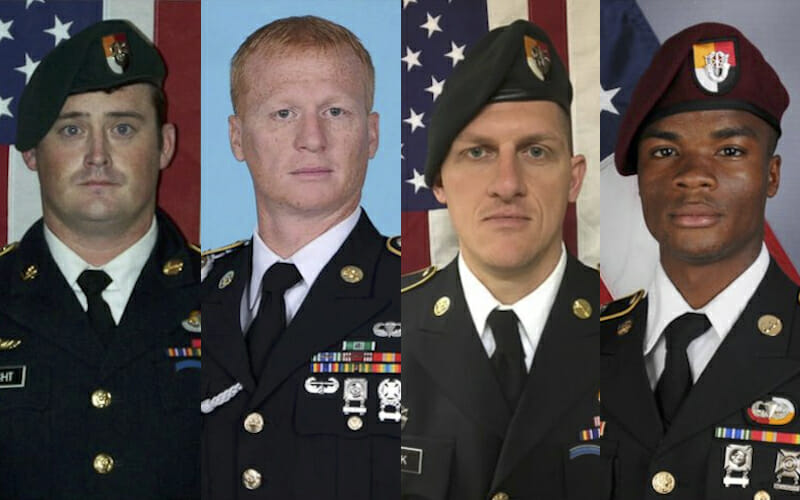
U.S. Soldiers in Niger: A Hidden Global Mission
Empires of scale are often spread thinly across fields of operations. Vast, often opaque functions on the ground are not necessarily conveyed with accuracy to the metropolitan centre. Command structures, for all the sophistication of instant modern communication, do not eliminate human error, let alone enlighten.
The four US army deaths in Niger have been shrouded by the bickering unfolding between President Donald Trump and the widow of Sgt. La David Johnson. John F. Kelly, the White House chief of staff, has also been catapulted into the sordid business.
What the Johnson episode has obscured, being rich as social media material, are the deaths of three others who perished with Johnson on October 4 in Niger: Staff Sgt. Dustin M. Wright, Staff Sgt. Bryan C. Black, and Staff Sgt. Jeremiah W. Johnson.
The Washington Post write up on the fallen is a feeling effort to add substance to those otherwise obscured by the travails of the US empire. Black was multilingual but also fluent in the Hausa language, as “he wanted to communicate directly with the people.” This soldier of empire was similarly adept at chess.
Johnson “loved his country” and proved “loyal.” “For some, he was the beloved crazy uncle who never let a dull moment seep into his day.” Niece Carrie Gomez’s words are noted: “He was wild and outgoing. Just always on 100; always making you want to pull your hair out.”
These charming if potted accounts serve a few purposes. They add an understandable note of veneration for the fallen, but they also betray the sheer expanse of US deployments in foreign theatres, not all of which are understood in the padded cell of thought that is Washington. Are these parts of a broader imperial mission, or merely the strutting efforts of a global police effort to keep terrorist elements in check?
Some 800 US military personnel operate in Niger, ostensibly to boost local counter-terrorism efforts. In total, some 1,000 operate in the Chad River Basin, spanning Niger, Chad, the top of Nigeria and the Central African Republic.
The four special forces soldiers were killed in an attack while patrolling with Niger troops near Tongo Tongo in the south-western part of the country, circumstances that will prompt some internal, not very pleasant probing. The skirmishing groups along the border with Mali are a motley assortment, varying between the plumage of Islamic State, led by Abu Walid al-Sahrawi, and opportunistic fringes of al-Qaeda.
Sketchy details of the sanguinary encounter have been sporadically supplied since October 4. The Chairman of the Joints Chief of Staff, Gen Joseph Dunford, attempted to fill in a few details on Monday. Help, it seems, was not sought till an hour after the attack had commenced. French and Nigerian assistance duly arrived, but by the time Mirage jets were doing their best, two hours had passed.
What exactly happened? Pentagon officials initially shot a finger at a self-radicalized IS group that had gotten lucky. According to Joint Staff Director Lt-Gen Kenneth McKenzie, US and Nigerien forces had “done 29 patrols without contact over the previous six months or so” with nothing so much as a sliver to suggest an imminent attack.
Grasping for explanations, McKenzie fanned the murderous appeal of ISIS, which still “have a powerful message in the cyber world”, one which propelled “self-radicalization.” The general, however, was unsure, claiming that there was “also some minimal flow of people across the divide.” For all his doubts, it was unlikely that the attackers “were foreign fighters that came from Syria.”
The engagement could not be read as a failure on the part of the US mission. Neither McKenzie nor Dunford would have you believe that. ISIS was being challenged, lashing out like a terminally challenged animal in various outposts of the globe. The attack “was a natural product of the fact that [it] is being crushed in the core caliphate.”
General McKenzie, along with his colleagues, have insisted that the US mission in Niger is heavily circumscribed, and by the book. They are not there to take part, let alone advise the forces of Niger in direct combat missions.
General Dunford has similarly insisted that there was on reason “to believe or not know that they did anything other than operate within the orders they were given.” But these distinctions are academic points, to be slogged over by believers in operational doctrine and public relations. What matters is the stretch, and expanse, of modern US power, the sort that doesn’t necessarily work, finding itself in bloody muddles, local grievances and struggles.
The US soldier’s imprint is a global one, finding form in theatres many citizens would be surprised, even perturbed by. South Carolina Republican Sen. Lindsey Graham went so far as to express open ignorance that 1,000 US troops were operating in Niger. They continue to apply the policing and erroneous language born in President George W. Bush’s war on terror, with all its conceptual and logistical nonsenses. As they do so, the bodies mount.

